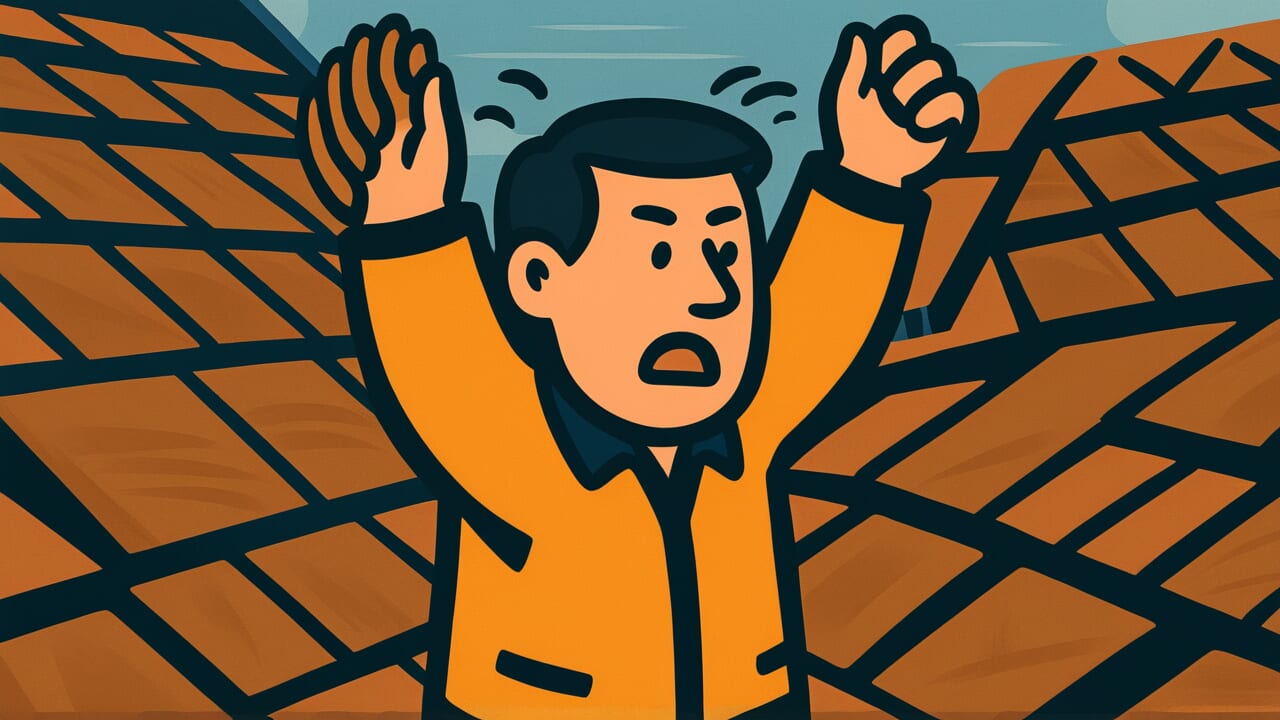How to Read “Even an angry person doesn’t blame a flying roof tile”
Doki aru mono mo hyōga wa togamezu
Meaning of “Even an angry person doesn’t blame a flying roof tile”
This proverb means that even an angry person won’t get upset over light jokes or playful banter.
In other words, no matter how bad someone’s mood is, they won’t direct their anger at harmless wordplay or minor jokes.
This proverb is used when explaining how to approach an angry person or when gauging how upset someone really is.
It shows a natural human trait: even seriously angry people soften their response to light topics or humorous words.
It also reflects the understanding that people aren’t so blind with rage that they blame trivial things unrelated to their anger.
Even today, light humor can ease tension in difficult situations. This is exactly the human psychology this proverb describes.
Origin and Etymology
The word “hyōga” in this proverb is an old expression rarely used today.
“Hyō” describes something dancing lightly in the wind, and “ga” means roof tile. Here, it’s thought to represent light jokes, puns, or playful remarks.
Like a roof tile blown by the wind, it’s a metaphor for light, harmless words.
No clear written records explain the origin of this proverb. However, based on its structure, it likely emerged from observing the subtleties of human emotions.
It contains insight into human psychology: even people with strong anger don’t waste their emotional energy on things as trivial as light jokes.
The expression “togamezu” (doesn’t blame) is also interesting. To blame means to criticize someone’s faults or wrongs.
Here, it means an angry person won’t make a fuss over something as minor as a joke.
This reflects trust in human balance: even angry people maintain the reason to judge what matters and what doesn’t.
Usage Examples
- The manager is in a bad mood today, but even an angry person doesn’t blame a flying roof tile, so light small talk should be fine
- No matter how angry someone is, they don’t blame a flying roof tile, so let’s try changing the atmosphere with a small joke
Universal Wisdom
This proverb teaches us a profound truth: human anger actually comes with reason.
When we think of anger, we tend to imagine a blind state dominated by emotion. But real humans are more complex and intelligent than that.
Even angry people have the judgment to distinguish between the target of their anger and a light joke in front of them.
This is a remarkable human ability. Even in an emotional storm, we can judge what truly deserves anger and what can be laughed off.
This wisdom has been passed down for generations because it serves as social lubricant in human relationships.
When facing an angry person, we tend to shrink back. But knowing that they’re human too and have room for tolerance toward light words opens paths for communication.
This proverb also teaches the angry person. While anger is a natural emotion, we should have the grace not to blame every little thing.
The balance between emotion and reason is the mark of a mature person. Our ancestors understood this deeply.
When AI Hears This
When the human brain chooses a target for anger, it instantly judges “Is this someone’s intention or just chance?”
According to psychologist Weiner’s attribution theory, we categorize causes of events by “controllability.” We get angry at failures that could have been controlled, but not at uncontrollable accidents.
Hyōga—a roof tile blown by sudden wind—is pure chance with no human intention involved.
Trying to find intention here means getting angry at “systems without will” like wind or weather. From an evolutionary perspective, this is extremely inefficient.
What’s interesting is that anger actually has a social function: “to change someone’s behavior.”
Anger evolved as a communication tool to prompt reflection and modify future behavior. So the brain unconsciously calculates “Is this anger worth the investment?”
Getting angry at a roof tile won’t make it learn. Yelling at the wind won’t change its behavior. In other words, there’s no return on the emotional cost.
In modern society, this judgment system easily malfunctions. Some people rage at AI errors or system failures, which is essentially the same unproductive act as “blaming a flying roof tile.”
But the human brain unconsciously senses “a human who designed it” behind the screen and misjudges that controllability exists.
This cognitive distortion is the true nature of modern technology stress.
Lessons for Today
This proverb teaches us that even within emotion, there’s a light of reason.
When you feel anger toward someone, having the grace to still laugh at light jokes is a sign of human maturity.
In modern society, we increasingly overreact to trivial things on social media and elsewhere.
But the wisdom to distinguish what truly deserves anger from what can be laughed off is needed now more than ever.
When you feel anger, pause and ask yourself “Does this really deserve blame?” This can help you avoid unnecessary conflicts.
This wisdom also helps when dealing with angry people. Just because someone is angry doesn’t mean you must close all communication.
Light topics and warm humor can become bridges that ease tension.
Maintaining balance between emotion and reason—that’s the timeless message this proverb offers us living in the modern world.



Comments